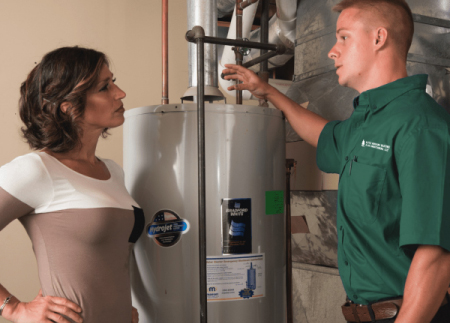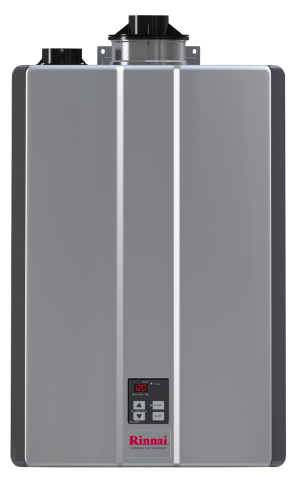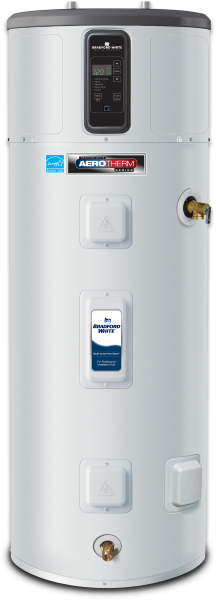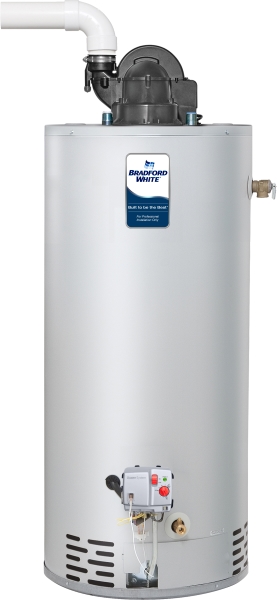
February 2024
By: Josh Walejewski
Read Time: 3 Minutes
Amid the hustle and bustle of our fast-paced, modern lives, there are many household commodities we take for granted. Those household appliances we couldn’t imagine living without but never cross our minds until they fail.
One unsung hero is our home’s water heater. We rely on hot water for many things. From being able to bathe and shower comfortably, to running our washing machines, dishwashers, and more.
In this month’s blog, we’ll break down the three most common water heater options available. These include conventional tank water heaters, tankless, and heat pump water heaters. Additionally, we’ll explore how homeowners can prepare themselves for the unexpected scenario of their water heater failing or, better yet, how to anticipate when a replacement might be on the horizon.
Types of Water Heaters
Conventional Tank Water Heater
The most common water heater found in homes is the conventional tank water heater. These systems are available in both gas and electric versions. As the name implies, tank water heaters have a large storage tank that holds your home’s hot water so it’s ready when you need it.
How do Tank Water Heaters Work?
The tank starts with the entry of cold water at its bottom, which is then heated by either a gas flame located below the tank or electric heating elements suspended within it. When there’s a demand for hot water, the heated water is pumped out from the top of the tank and circulated through the home’s hot-water supply pipes. As the water in the tank is used, it’s automatically replenished with cold water, initiating the heating cycle once more.
Pros and Cons of Tank Water Heaters
Benefits
- Minimal retrofitting for replacement
- Lower upfront cost
- Available in both gas and electric options
Considerations
- More energy use and waste
- Larger and takes up more space
- Energy waste from standby heating
- Average Lifespan 8 – 12 years (lowest among 3 discussed)
Tankless Water Heaters
Tankless water heaters outshine traditional storage tank water heaters in energy efficiency and their ability to provide endless hot water. This is achieved by heating water only during its actual usage. This eliminates energy waste from standby heating required on tank water heaters.
How do Tankless Water Heaters Work?
When hot water is needed for an appliance or faucet, cold water begins flowing into the unit. The flow of water automatically triggers the unit to begin heating. As water moves through the heat exchangers inside the unit, it is instantly heated until the call for hot water is no more.
Tankless water heaters are also referred to as ‘on-demand’ water heaters. This is because there isn’t any downtime to replenish/heat a storage tank. Tankless units are best for households with many occupants or those whose demand for hot water is high.

Benefits:
- Endless Hot Water
- Available in gas or electric versions
- Take up much less space
- Gas/Energy Savings
- Available in both gas and electric options
- Longer lifespan than tanked 20 – 30 years.
Considerations:
- Higher upfront cost
- Additional retrofitting required on certain applications
- Existing gas line and/or meter may not be large enough to accommodate gas needs
- If electric, you may need electrical panel upgrades to handle electricity demands
- Trouble keeping up with demand if too many appliances require hot water all at once (multiple people showering at once, or showering while running dishwasher and/or washing machine.)
Heat Pump Water Heaters
 Heat pump water heaters use a storage tank, just like conventional water heaters. The main difference between the two is how the water is heated.
Heat pump water heaters use a storage tank, just like conventional water heaters. The main difference between the two is how the water is heated.
How Heat Pump Water Heaters Work
Heat pump water heaters use the same technology as heat pump systems for a home’s heating and cooling. Rather than burning fuel directly to generate heat, heat pump water heaters simply move heat from one location to another. The heat pump water heater extracts heat energy out of the surrounding air and transfers it to the water in its storage tank.
Benefits
- Extremely efficient compared to gas and electric resistance water heaters
- Better for the environment
- Many heat pump water heaters qualify for the best state and federal tax incentives
- Slightly longer lifespan than conventional water heaters (10 – 15 years compared to 8 – 12 years)
Considerations
- Higher upfront cost
- Can cool down the surrounding air
- Longer regeneration times
Signs It’s Time to Replace Your Water Heater
Age
A water heater that has surpassed its expected life span is the easiest way to know it’s past its prime. Conventional tanked water heaters have a life expectancy of 8-12 years. A heat pump water heater tends to last slightly longer with a life expectancy of 10-15 years. Tankless water heaters are top tier when it comes to life span, coming in with a life expectancy of 20-30 years.
Your Water Isn’t as Hot as It Was
Another sign it’s time for a replacement is that your water doesn’t get as hot as it used to. As your water heater ages, sediment accumulation becomes a concern at the tank’s bottom, typically where the burner is located. This buildup may result in reduced heating output and higher energy bills.
Leaks Coming Directly from the Tank
Repairing leaks coming from plumbing connections or the unit’s pressure relief valve is easy and inexpensive. However, if the leak is coming from the tank itself, it usually means a replacement is needed.
Conclusion
Navigating water heater choices is essential in making the most informed decision when replacing your water heater. From traditional tanks with minimal retrofitting to tankless marvels providing endless hot water and eco-conscious heat pumps, it’s important to know which type is best for your home.
Whether it’s time for a replacement, you require repair, or your water heater just needs some TLC in the form of regular maintenance, Kettle Moraine Plumbing Services is here to help.
Read more blog posts from Kettle Moraine Heating & AC.
About the Author
Josh Walejewski
Josh is a professional marketer who has worked in the HVAC industry since 2017. With a Bachelor of Applied Arts and Sciences Degree (B.A.A.S) in marketing and sustainable business management from the University of Wisconsin, he has a passion for all aspects of HVAC, business, marketing, and environmental stewardship.


![September Email Header [recovered] 24 Bath time hot water](https://www.kettlemoraineheating.com/wp-content/uploads/2024/02/September-email-header-Recovered-24.jpg)



